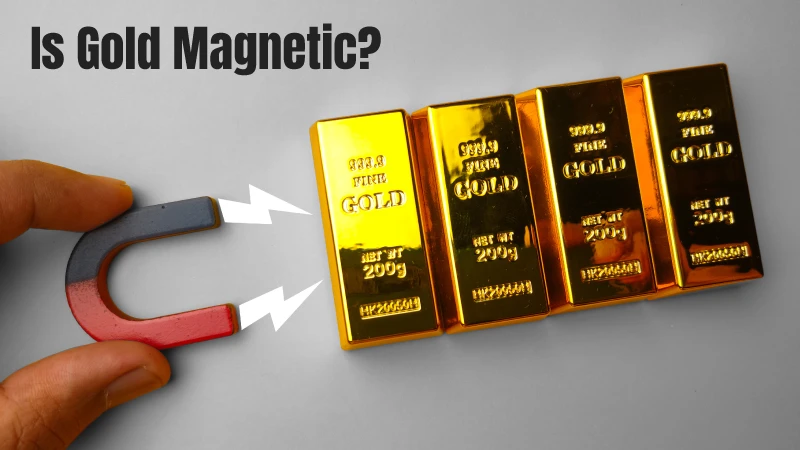Have you visited a jeweler and wondered, despite having magnets in the weighing machine, the gold doesn’t stick to it? So, is Gold Magnetic? Such questions are bound to arise in your curious mind, and the answer is crucial to be known for your pockets! Let us enlighten you with the answers to whether is gold magnetic material or is gold magnetic or not.
Is Gold Magnetic?
Simply put, No! Gold is not magnetic. But is it a metal yet non-magnetic? Why doesn’t gold, like Iron, nickel or cobalt, display magnetic properties? The first step in deducting this phenomenon is the concept of magnetism.
You might have come across the word “Noble metal.” Since Gold is a noble metal, it is non-reactive. Imagine an extremely nonchalant person in any situation: No reaction, but have a great personality once you get to know them. Similarly, in any situation or with any other chemical or material, gold doesn’t react. However, gold can temporarily possess magnetic properties when placed in a strong magnetic field.
Let’s break down the concept of magnetism and how magnets work.
How Do Magnets Work?
What if we told you that We live on a large magnet called Earth? Now, you might realize why there is a north pole and a south pole.
Here’s the ground rule of magnets:
Opposite Poles attract and Like Poles repel.
Magnetism is actually one of the four fundamental forces in the universe that makes the universe work. You would know that magnets have a north pole and a south pole, and they attract specific metals when kept at a position.
Magnets in general are objects that produce magnetic fields that attract metals like cobalt, nickel, and iron. When we stated that gold can be temporarily turned into magnets, it meant that gold can be turned into soft magnets that produce a magnetic field within the existing magnetic field(s).
Top 5 Interesting Facts about Magnets
1. Earth is a Magnet!
Earth, in all aspects, is a huge bar magnet with a north pole and a south pole. It has its invisible magnetic field lines running from north to south, which the needle of the compass points at!
2. Metals can become Magnets.
Ferromagnetic Metals (metals with magnetic properties), like iron, can be turned into temporary magnets with strong rare earth magnets.
3. The Most Powerful Magnet – Magnetar!
More powerful than Earth and more powerful than Magneto himself, the magnetor can destroy small planets if it gets closer to one. Formed from a supernova explosion from a star, they have a magnetic field of 1,000 times stronger than a neutron star.
4. MRIs are Stronger Magnets than Earth!
The Magnetic Resonance Imaging (MRI) machines that you see in a hospital that has a magnetic field 60,000 times stronger than that of Earth.
5. Magnets Affect Animals
Migrating cycle, communication patterns, and other behaviors are influenced by magnetic fields. Animals and birds like bees, whales, and turtles can see magnetic fields and use them as a guide.
Magnetic Vs Non-Magnetic Metals
| Magnetic Metals can be naturally found or can be compounded or alloyed. | Non-magnetic metals can also be naturally found as ores and alloys. |
| Three types of magnetic metals are Ferromagnets, paramagnets, and diamagnets. | Non-magnetic metals are only a few from the periodic table that are mostly precious noble metals. |
| The magnetic metals are iron, nickel, and cobalt, and the alloys are steel and stainless steel. | The non-magnetic metals are gold, silver, copper, and aluminum. |
Is Magnetism a Good Way to Test Gold?
Magnetism can prove to be a good way to test gold when you are testing its purity. Gold is naturally a soft metal. Thus, in its purest form, its is highly malleable and its shape can be easily changed. To avoid this and maintain the shape of the product, gold is alloyed with other metals.
Testing the purity of gold with magnets depends on the magnetic properties of the alloyed metals. If the piece of gold responds to the magnet, then it is not pure. Whereas, if gold doesn’t respond to a magnet, it is .9999 (99.99%) pure.
If you claim that you have pure gold, but it responds to a magnet, you may want to visit the person who sold it to you!
Final Thoughts!
So, is gold magnetic or not? We believe you can answer this with ease now. Gold is an exquisite metal that has been loved worldwide for ages and will continue to do so. The reason why you need to know whether gold is magnetic is to avoid yourself from getting fooled in a world where numerous counterfeit products are offered.
Finally, as an investor and collector, you can buy tangible gold in the form of bullion including coins, bars, rounds, and jewelry. Our wide selection of bullion and jewelry brings together the best deals for gold products in the market! Explore BOLD’s collection today!
Happy Investing!


